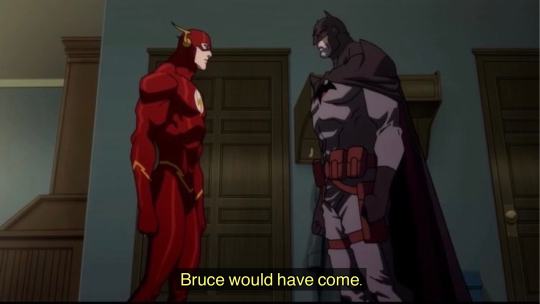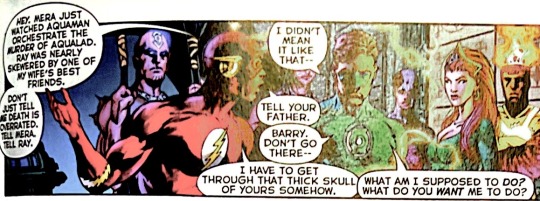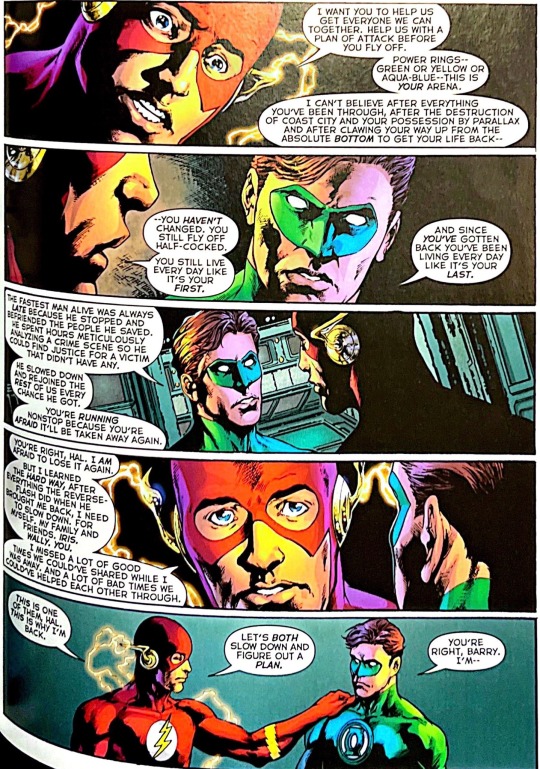#'too late' doesn't necessarily mean 'death' btw
Note
hi, it's f0r! gimme some 🔥🔥🔥 for jjba, kira specifically, and/or barry allen!
i can always count on you to be after my own heart <3
🔥barry: idk enough abt the general consensus on flash media to know what’s unpopular, but i will say, i don’t see enough ppl talking abt him being a fucking asshole. he drags up dead people’s names to make a point, like he fights dirty
examples + analysis under cut (spoilers for flashpoint paradox + blackest night, but mostly bc it gets real long)

this is an alt timeline where bruce died in the alley instead of his parents, resulting in his father becoming this world’s batman. barry is trying to convince batman to come with him to restore the timeline, so he brings up his DEAD SON as a persuasion point?? tbf the world IS ending, plus bruce is very much alive to barry, and he IS trying to get him back, but still a dick move

(pls forgive the ass quality, i was scrambling to take a pic bc the store was closing in 10 min 😭)
hal: death is overrated anyway.
barry: don’t tell me that, tell [the ppl whose loved ones have passed].
hal: i didn’t mean it like that—
barry: tell your dead father.
me: HELLO?!? BARRY??!?!
hal Was being an asshole too so ig barry was just trying to fight fire with fire. he seems to only go this far when ppl's lives are at risk, so i can follow his thought process at least.

the page continues to have hal taunt him for caring too much, and the crazy thing is that barry actually concedes. i was overselling it when i said barry fights dirty bc this is sm more than a petty argument to him. he's not trying to one-up or spite hal, it’s a last resort. so when hal turns it back on him, barry doesn't get defensive back. he knows how much he's hurt his loved ones by being the flash, he regrets not being there for hal, and barry admits to being scared of losing it all again—turning hal's call-out into a moment of emotional vulnerability. and only THEN does hal finally realize what barry's been saying.
so there are 2 interesting things happening on barry's end here. barry’s the type of person to follow the golden rule pretty literally. i've mentioned before in a past meta that barry believes in the goodness of humanity bc he can be—HAS to be a firsthand example, not just to others, but to himself. if he can be a good person, then surely others must be as well. props to the character consistency across all these different media bc this idea even (and especially) applies here:
1) the golden rule, treat ppl the way you want to be treated, giving hal a taste of his own medicine so that he understands. it’s important to note that, again, barry does this out of desperation, not pettiness. and he might be dishing it out, but he can take it too. he chooses kindness when he could've easily dug his heel in after hal tried to call him out, but barry is trying to reach out to hal, not fight against him, and diffuses the situation that he ramped up. before this, my immediate impression was that barry spoke callously out of heightened emotions or misreading others, but the way he’s been leading this conversation and responding specifically to hal’s own emotions shows how calculated barry actually is.
2) like i said, barry goes by the mindset of “if i can do it, then so can you.” he draws a direct comparison to both of their deaths (they died and came back btw) and says he can’t believe that even after everything hal has gone thru, he’s still acting like this. personally, i read this as genuine shock and disbelief, not necessarily a dig at hal. but regardless of intention, hal takes it as an accusation, so he flips it back on barry. however, barry realizes that hal is deflecting. this is where he draws that comparison. barry had to learn his mistakes the hard way. he only realized all of this when it was too late, when he already died. he acknowledges that he’s repeating his mistake of fearing for the worst, but the thing is that he’s learned from his past, grown and changed with it. and so he projects this growth onto hal as if their deaths were at all similar (keep in mind, this is the issue where hal tells barry “i died a sinner, YOU died a saint”). again, going back to that idea of “if i can do it, then so can you.”
i think the only reason it works here is that barry knows hal. he can read him, and more importantly, has total faith in him, more than hal is willing to accept. barry’s hope in ppl is just unconditional, for better or worse; he wants to walk hal thru this together, he switches his language from “you” statements (“i can’t believe you haven’t changed) to “us” statements (“i missed a lot of good times we could’ve shared while i was away. and a lot of bad times we could’ve helped each other through.” … “let’s both slow down and figure out a plan”). to quote my friend emm here, they know and trust each other enough that barry can push that boundary and still end up at a reasonable middle ground.
barry is so full of good intention but he doesn’t exactly play nice if he thinks he knows what’s good for you. “if i can do it, then so can you” is a double-edged sword. he wants to believe in the absolute best in others. it doesn’t matter how many mistakes they’ve made or what their past may be, barry has hope if nothing else. but in the same way, it can be a presumptuous thing, setting the bar too high, putting too much pressure onto others. barry is all about the potential of things, working towards a brighter future, but what about the present? what about NOW? barry used to be troubled by his past, but then he gained closure and learned acceptance, so all he does now is look to the future. his powers put him out of touch with time and reality, but he’s never really been able to live in the present; his superspeed only enables this. past, future, but never the present, no wonder he’s so stubborn.
god, see what i mean! do you see what discussions could arise from dissecting the intricacies of barry’s hero complex! he’s not just a superhero paragon, he’s not just some vanilla good guy (tho he is also all of these), there is an entire thought process and timeline of experiences and flaws to study under a microscope here. and buddy, i am getting my barthology degree.
#danswers#danbles#meta#halbarry#barry allen#hal jordan#the flash#green lantern#take this with the heaviest grains of salt bc even tho these scenes inspire confidence in my overall interpretation#it’s possible that i’m missing some context bc i had to skim (again store closing in 10 minutes)#deepest apologies for how long this became i simply had an aha! moment halfway thru and couldn’t stop#major thanks to emm for giving me feedback <3
46 notes
·
View notes
Text
why is it so hard to defect from Atlas?
Barbara Dunkelmann said during Comic-Con at Home last year that this season’s theme would be “distrust,” but i’m wondering now if the more appropriate word is “discontent.” since Divide, we’ve had arguments big and small, teams splitting up and recombining, and of course, :( and :/ galore at all the war, all the crimes, all the war crimes, and all the general bad decisions (not to be confused with James Ironwood, General Bad Decisions). we’ve now had our first major defections of the season with Hazel and Emerald, which is...interesting to me; they’re both long-runners, certainly, but part of the reason they’re long-running is because their arcs have ALWAYS been on a slow boil. for the defection to happen around the mid-season mark, a lot of things (particularly for Hazel) had to happen very quickly, particularly since they both skipped out the previous season altogether. this is made all the more interesting by the fact that the Atlesian supporting cast who filled the time in season 7 are similarly discontented, but...well, a generous reading of it would be that they’re still “figuring things out,” but we’ve also been watching them “figure things out” for two seasons now, Winter and Marrow especially. why did Hazel and Emerald defect first when they work for the main villain, when Winter and the AceOps--who have taken up more screen time cumulatively during the Atlas arc--are still hemming and hawing to various degrees?
long discussion under the cut--but the tl;dr is: it’s because they live in a (narratively constructed) society
i’m actually gonna start with the discontent that DIDN’T result in defection, which is obviously the Yang-Ruby split. we’ve known that members of Team Protagonist--most notably Yang and Ren--have had doubts for a while now, and sure enough, when push comes to shove they pick a path separate from their implicit leader. as protagonists Yang and Ren are frequently our POV characters, so we’re predisposed to sympathize with them as they doubt Ruby’s agenda, root for them as they bring it up to Ruby in conversation, and...watch as they...regretfully but cordially agree to disagree...
wait, what?
that’s the thing about Team Protagonist, especially at this point in the narrative: everyone feels safe and secure enough in themselves and in each other to communicate openly, even when they disagree. every time Yang felt uncomfortable she talked to somebody about it, and even Ren--Mr. Weaponizing Repression himself--was able to express how he felt. even if it took some prodding from Nora/Yang, even if the direction of his emotions ended up misfiring and hurting his friends--they’re his friends. his family, even. Team Protagonist is able to act and stay together so effectively because they make open communication a priority: they follow Ruby’s lead, but they also trust that Ruby will LISTEN to them, even if she doesn’t always agree.
(the reason they had this disagreement at all is because of the time they couldn’t talk things through, and just had to uncritically back Ruby’s play--when they first entered Atlas. funny, that.)
Team Salem obviously doesn’t work the same way, and this season has made it particularly explicit just how much everyone lives in a state of constant fear and surveillance. what makes solidarity and eventual rebellion possible (though terrifying), though, are two things: first, Salem--being an upstart herself--actually encourages a level of individual initiative in her followers (well. encouraged; i have a feeling with the Hound being a success and Hazel and Emerald’s defection she’s about to change her tune). she’s a master manipulator, and uses people’s individual wants to sway them to her side; but she’s also not a mind-reader, which is kind of biting her in the ass right now.
second, Salem herself is so many LEAGUES beyond everyone else on her “team” that (unless you’re actively trying to be a tit) there...isn’t actually much of a hierarchy beyond “Salem’s in charge.” Watts and Cinder--both Atlesian to varying degrees, mind--are the two who try the hardest to carve out some authority of their own, but even Watts is at least convivial with everyone (except Cinder). to be on Team Salem you have to accept that this is her world and you just live in it, and that ends up equalizing people from very disparate backgrounds with very disparate personalities and skillsets. no one, not even Tyrian, is under the delusion that Salem cares about them, or will listen to their counsel. so when it comes to the least of her followers--Emerald, who (joke copyright @professorspork) is basically Salem’s grandpet, this gerbil who follows her around now for some reason and occasionally makes weird noises (”you mean crying?” Emerald asks, crying)--it’s actually quite easy for her to escape Salem’s notice until it’s too late, while firming up the solidarities that she has (Hazel and Mercury--not Cinder).
to defect, Emerald and Hazel need a degree of narrative interiority, some sense of security with each other (even if it’s just subconscious), and time. time to work things out from their point of view, pull the wool from their eyes. this season’s narrative has given them all that and more.
our Atlesian potential defectors...haven’t been so lucky, and the most recent episode has made that contrast very explicit.
i’m sure i’m not the only one who assumed, when Ironwood first floated the bomb plan, that we’d be getting some kind of Mission Impossible sneaky stealth shit. we’re used to seeing the AceOps do small squad missions, after all, and the timing felt right thematically too, since we left War with Ren literally expositing to all of them that they do, in fact, have feelings. an extended mission to themselves would give them a chance to air out those feelings away from Atlas’ own system of surveillance, figure out what to do together...
but we didn’t get any of that. instead, we got the whoosh laser kapow version of a Sassoon poem, and the AceOps barely talked to each other at all. the only points of view we got were from Marrow, and Winter.
this isn’t the first time something like this has happened to them this season, either--remember the Penny Retrieval mission that wasn’t? there were also hopes that Marrow and/or Winter would turn at that point, but then Salem invaded. Winter and the AceOps have had the potential to defect for a while now, but the narrative has been actively withholding opportunities for them to actualize on any of that potential. it’s been actively withholding opportunities for them to act as a team, period.
it’s possible to handwave this as writerly convenience--everyone can’t defect at the same time, the episodes don’t have room for it--but the ways that defections have been prioritized so that the Atlesians come after also points to a recurring motif with Atlas, which Elm says explicitly in Witch: you can deal with your issues later.
there’s always some kind of delayed promise at Atlas, isn’t there? the Amity project will help. Mantle’s Wall will get fixed (until it wasn’t). when Penny confronts Winter about leaving Mantle to die, Winter says first that they don’t have time, and it seems like they never actually do, except for in this imagined later, when they’ll reckon with every thing that they’ve done.
it doesn’t exist, of course. fascism is only able to remain effective through the engineering of crisis, and Salem might as well be a crisis perpetual motion generator. you can’t conscientiously object if your conscience is constantly stifled by the next emergency.
what the Atlesian scenes in Witch demonstrate is this: Atlas presses down all around them, at all times. even if the AceOps want to stop policing each other and work as a real team, they can’t right now, because they are now officers in a war, because they’re constantly looked to, because they’re part of an infinitely greater machine that demands their service. and right now lasts forever--you will NEVER have time to talk out your discontent...
and even if you steal time and perspective like Marrow does (like Emerald has been doing, thief that she is) with Winter, there is no guarantee of any solidarity. what makes their conversation so simultaneously fascinating and frustrating is that there is clearly some level of rapport, or at least recognition. Marrow goes to Winter because Winter’s in charge, but Marrow also goes to Winter because Winter might hear him out...and she does. Winter does what Winter has consistently done when a person seeks her out and earnestly asks to be heard, and responds compassionately. but at the same time, Winter does what Winter has consistently done when a person seeks her out and earnestly asks to be heard: she turns away. in a conversation that is supposed to be about a shared trust between the two of them, Winter cannot bring herself to trust Marrow. the Atlesian system is built out of these hierarchies within hierarchies, distrusts within distrusts (well i guess Barbara had a point after all), and Winter, abused kid that she is, has played this game all her life. so she defaults to rank and duty--what they have to do now--and the conversation goes nowhere. Marrow leaves it as alone and bitterly resigned as when he’d entered it.
so when is this moral inertia gonna go somewhere? IS it going somewhere? well, i’m still holding out hope that the AceOps will get some time to themselves as part of Bomb the Whale, and i’m certain that even if it doesn’t fall into their lap Marrow will eventually demand it. the fact that they still work well together on the field as partners should mean something. the question is, though: what will it take to bring that later to the present?
and at what point does it become too late?
223 notes
·
View notes